'I can promise you, when I went back to the changing room, I destroyed everything'

Romain Poite is as disarmingly honest off the field as he is firm and resolved on it. The public persona – the game face – is a ploy to ensure that every player gets the same rigor, fairness and justice.
On this day, beaming rosy-cheeked onto the Zoom call, he is typically bright. Happy that another fitness session has been conquered in the searing Toulouse heat, bringing him a step closer to what he hopes will be a grand farewell at France 2023. Happy that his family are around him. Happy that he is still whistling at the peak of the game that has captivated him since childhood.
This is not a deep dive into the minutiae of refereeing. Let us leave vexatious scrummages, high-tackle frameworks and the grave peril of the breakdown for another day. Let us talk instead about the person behind the whistle. The inspecteur de police who paced the seedier streets of Lyon on nightshift; the detective who chased down criminals in Toulouse.
The man who cows unruly rugby players as a cop might admonish a gaggle of teenagers causing mischief down the high street, but in his private life, is a jovial father with vulnerabilities like the rest of us. The official who has been ruthlessly castigated for his mistakes, and warmly celebrated for his deadpan quips.
“I like equity and justice,” Poite tells RugbyPass. “It was a big honour to find something wrong that happened and help people in a society which is sometimes unbalanced.
“Like on the field, as a policeman we try to give the opportunity to everyone to understand life and be comfortable. Sometimes we found the solution, but sometimes we had to send them to jail. The main thing was to keep in your mind not to judge someone. You see the problem, you connect with the law, you resolve the problem. You are not on the field or in the police office to judge someone, or change or educate someone. You are there to remind them of the law and the good things of the community to live together.”
In other words, one is the referee, not the coach.
“If you did wrong, it doesn’t matter if you are a good person or player,” Poite goes on. “I do my job; I just remind you what is the right thing to do by law.
“It’s not to balance something or to be… many supporters think, ‘Look, this referee is in the middle, he wants to be on the TV, on the screen’. We don’t want that. Because the main thing for a referee is to leave the field with no calls about the refereeing. Unfortunately, we have weaknesses. We do some things good and some things wrong. We work on what we did wrong to improve and to respect people.”
Referees are armed with an extensive technological arsenal but they are not machines. They do not oversee a match with the unerring precision of a regulatory cyborg. Poite, in particular, has at times seemed to prefer to back his senses and his instincts over a battery of replays. Those very human attributes are very humanly fallible.
During a Rugby Championship match in 2013, he yellow-carded Springboks hooker Bismarck du Plessis for a colossal but legal shot on the totemic All Black Dan Carter.
When Du Plessis later led with his elbow into a collision with Liam Messam, Poite had little choice but to show him a second yellow. New Zealand won the game 29-15 and went on to claim the Rugby Championship. World Rugby (then known as the IRB) would acknowledge the error and strike the red card from Du Plessis’s record in the days that followed.
The storm that followed was fierce. Poite was savaged on South African television. A Facebook petition to prevent him refereeing another Test match hit sixty-thousand likes. One meme, he says, showed the referee beheaded.
“I get a salary to be, not perfect, because we want to reach the perfection but we are not able.
“I had two big times in my life. In 2013, New Zealand v South Africa, I did wrong with the first yellow card. Unfortunately, afterwards I had to send off Bismarck du Plessis because of a wrong decision.
“That was an amazing game, I watched many, many New Zealand-South Africa games in the Rugby Championship and it was like a final for me. I was very proud to get the appointment.
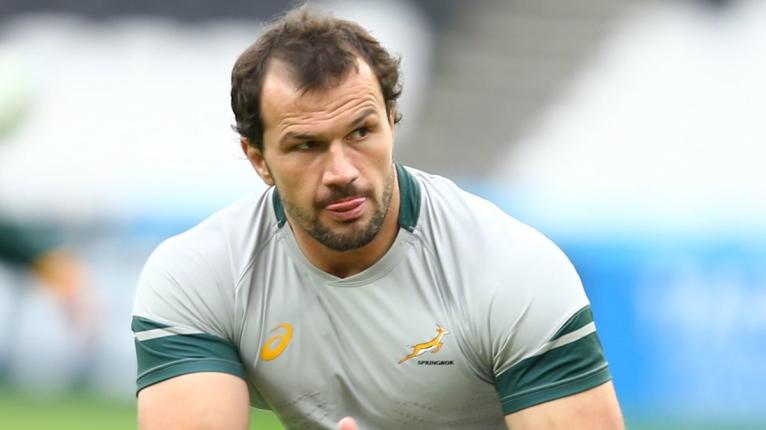
“The appointment is good when you do well, but that was a bad one. I support myself; the main thing was my elder daughter was on Facebook, she saw me, they cut my head, something like that. It was more about my family. I just worked on my game, worked on my job, worked on what went wrong and what I had to improve, and I did it.”
Rightly or wrongly, rugby people will forever associate Poite with the British and Irish Lions tour of 2017. With the scores tied in the final minutes of the final Test, and the series poised at 1-1, he ruled Ken Owens’ playing of the ball in an offside position to be accidental, not deliberate. A scrum, rather than a penalty. A drawn Test and a shared series, rather than a kick at goal for Beauden Barrett and a shot to seize it all for New Zealand. It was a wounding experience.
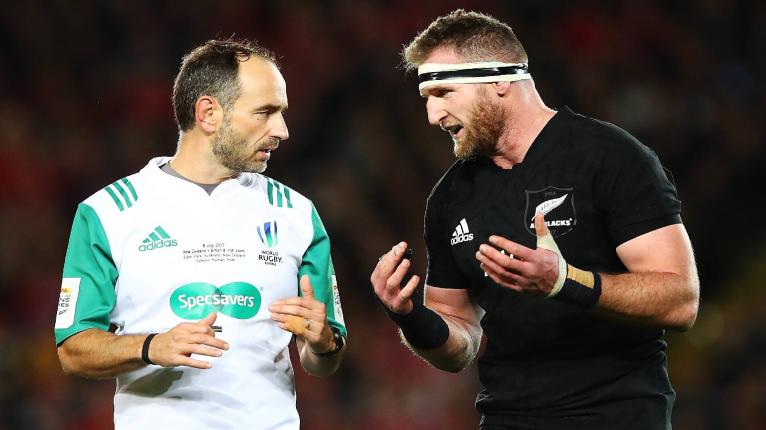
“Many people rung me after the game and told me, ‘That was a mistake, but it was justice, the right decision to make’,” Poite says. “Even the World Rugby staff management gave me this call. But I said that I am paid to make a big decision at the end of the game. That was my concern.
“I can promise you when I went back to the changing room, I destroyed everything, because I was angry against me. That tour was a human story with Jerome Garces, Jaco Peyper and many people, as in 2013 with Craig Joubert and Chris Pollock [the referees who took charge of the other Tests]. I felt the refereeing in this tour, 2017, was great. And what will we remember? Just the last decision of the tour.
“I was angry about me, because I destroyed the feelings of everyone about the refereeing overall. It’s a group, it’s a team, it’s a family. In my view, I did wrong for the others. I support my mistake; I am happy to say I did a mistake because I am human.”
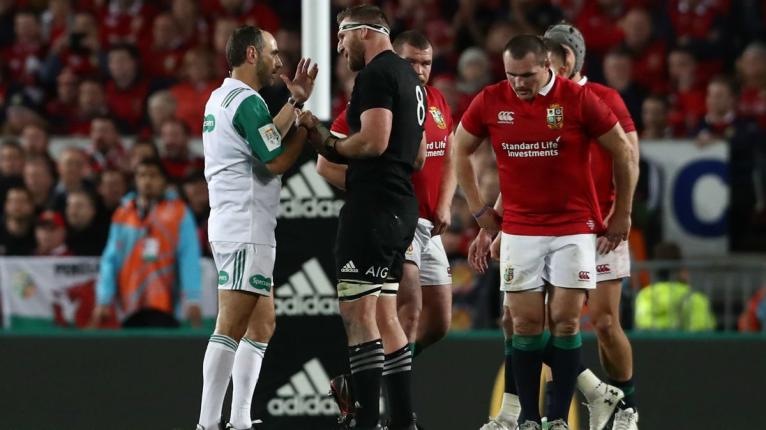
There is a sordid core to all of this human error. Mistakes stoke fury and outrage. The sense of injustice yields frothing indignation, which can so easily give rise to personal attacks.
Rugby claims to be above such bile, but patently it is not. Bryce Lawrence never refereed in South Africa again after his handling of the 2011 World Cup quarter-final between the Springboks and Australia over fears for his safety. Steve Diamond, the former Sale director of rugby, was banned for 18 weeks and fined £4,000 for abusing Wayne Barnes in 2012.
More recently, after refereeing England’s Autumn Nations Cup final win over France, Andrew Brace received heinous abuse on the online obituary of his late father. The vitriol, coming chiefly from French accounts, led to EPCR changing Brace’s next appointment to a game in Coventry, rather than Toulouse.
“I did my best, I was proud to spend those years because it’s a passion, more than a job,” says Poite. “I don’t think about the past, even if it’s painful. I make the step to leave that because I work on it and try to improve it. Could I change the decisions for both games? No. Then, what can I do? I just work on those situations to get knowledge and learnings, not to be in the position to be blamed like I was then.
“If people remember me as a bad referee, I accept that, I have no problem. But you can’t referee more than 70 Test matches, over 100 EPCR games, over 200 Top 14 games, if you are a bad referee. Sometimes people love me, sometimes they don’t.
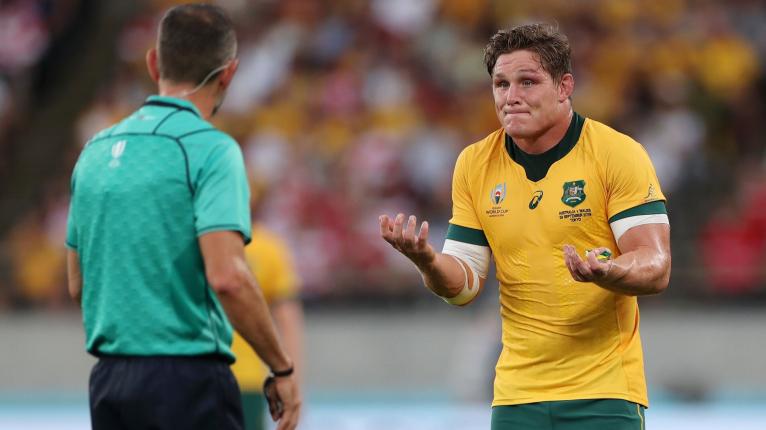
“The second thing is, behind the referee, there is a man. On the field, I’m strong, like a policeman. Off the field, I’m not the same. I took the way I was as a policeman, because I thought, if you smile at someone while you blame him or punish him, it’s like you joke about him. That was my feeling.
“Some referees have the ability to smile even if they give a strong decision or penalise someone. When you have someone who is cold on the field, you don’t want to love him, because you think he is like a wall, he is empty, he doesn’t have a mind, he doesn’t have feelings. That’s not right. I love to joke in the changing room before the game. I love to joke with my friends, my wife, my daughters. But you have a role, and that was my option. I don’t know if it’s a good or a bad one. I just wanted to become a better person for me and for life – that’s it.”
What about the laughs, though, the brilliant remarks and slightly unorthodox route to arriving at decisions?
The polite but frank edict to James Haskell that it was down to the England flanker and his coaches to combat Italy’s no-ruck tactic, not Poite’s responsibility to help them.
The burrowing, jackal-like, into a pile of bodies to catch sight of Tadhg Beirne grazing the Scottish try-line with the ball earlier this year. The comforting words to Jonny Sexton in the same match, assuring Ireland’s captain that Scotland would not be allowed to take a tap penalty while Sexton spoke to his players. ‘Jonny, don’t be scared’.
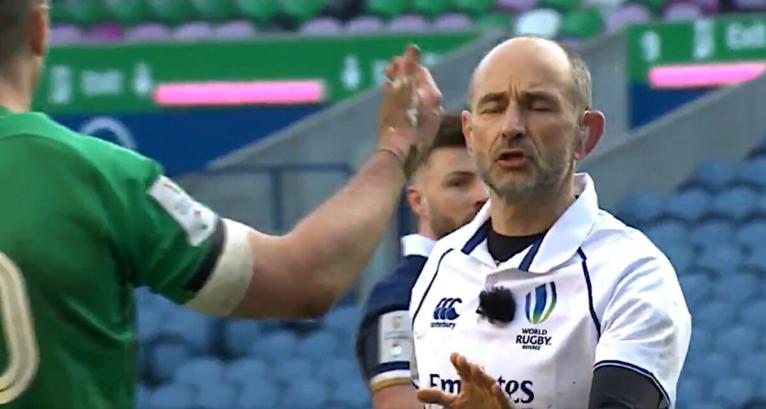
“For the two cases in the Scottish Six Nations game, I wanted to find the justice,” says Poite. “This Beirne try, I was convinced that was a try. If I came up to review that, I was pretty sure there was no angle to award it. That was a big spot in this game, and to give the respect for Ireland, and any Scottish players didn’t complain because they knew that was a try.
“For Jonny Sexton, that was my sentence – like James Haskell, maybe not the right one, but I didn’t have enough time to think of what I should say or do in this English language. I am happy to get the funny things for the crowd or supporters.”
Indeed, Poite admires Nigel Owens, but would never want to match the Welshman’s searing wit on the field or on social media. He does, though, fear the role of the referee remains shrouded in mystery, that while supporters do not fully understand the rigors of the job, they will not appreciate the graft and skill it entails. And that the potential referees of tomorrow could be put off by what they see and hear online.
“This is our part: we need to communicate more than we are doing,” he says. We could have a big impact, sometimes right or wrong, on the game. People must understand how we work; how we are working during the week, because it’s not just one hour and twenty minutes, this job. It’s along the week, the month, the year, the career.
“This part is in the dark. We work on everything. You can pick up ten situations in each half that you must improve. It’s not to say I have the power and you must accept what I do. No, it’s not that. I made a decision, maybe a wrong one, and I will work on it.
“Even if we are strict and strong, we are human, and we apply what World Rugby want to see and decide for us. It’s not to push away the responsibility, but we apply something that people want. World Rugby is not just referees – it’s always old coaches, old players, other people in rugby, and they decide what they think is better for rugby.

“Many people with whom we speak after the games don’t know what our life is exactly. It’s a lovely life, a privileged life, but you have to work hard to improve yourself and not to improve for a trophy because we don’t win or lose, we don’t care about the winner or the loser, we just want to give the chance for everyone to be happy after a game.”
At 45, Poite knows he is in his twilight years. His goal is to reach the next World Cup, and then call it quits. The tournament is being held in his homeland and he longs to be a part of it. The 2023 edition would be his fourth as a referee, and fifth as a match official. A fitting way to bow out at the summit of the sport he loves.
“I train hard, improve my fitness stats every time, but it’s not my decision. You have to accept the decision made by World Rugby to say, ‘Okay Romain, that’s enough now’. I would say, ‘Thank you’. I don’t want to be mad; I don’t want to be angry. Because look at the time I spent. I loved the time I was involved in the big events. The difficulty is to make the call by yourself. When you enjoy your life, you don’t want to leave it – sometimes you need help to leave it.”
You can’t imagine World Rugby are in a hurry to usher him out the door. Poite has real-world experience with real-world law. He has a quiet wisdom and a vast number of top-class games under his belt. He philosophises about the importance of his two professions and why society and sport can never do without them, no matter their human flaws.
“Think why we need a referee, why we need a policeman. We need them because we have two teams on the field who want to beat each other. And there are too many disagreements to get a victory fairly. You need a policeman. You need a taxman. You need those kinds of people.
“Why? If you are able to live in a society, if you are able to play on the field with agreement every time, even when you see a wrong from the other team or from your opponent, I’m happy to leave the police and happy to leave the rugby.
“In society, you have many people and we are all different. Just think why you need a referee and you will understand the role of refereeing or policing. Just think why I need this man in my life.”







































Comments on RugbyPass
Thanks for that Marshy, noticed you didn't say who is gonna win it. We know who ain't gonna win it - your Crusaders outfit. They've gone from having arguably the best Super Rugby first five ever, to having a clutch of rookies. Hurricanes all the way!
1 Go to commentsGeez you really have to question the NRLs ability to produce players of quality. Its pathetic. Dont the 25mil in Aus produce enough quality womens players. Sad.
1 Go to commentsBulls fan here, and agree 100% with the conclusion (and little else) of this article. SA sides should absolutely f-off from the champs cup until we get fair scheduling, equal support for travel arrangements and home semis. You know, like all the european teams get.
20 Go to commentsI’m yet to see why Grace would be an ABs contender. He’s pedestrian and lacks the dominance required of a top flight 8.
9 Go to commentsGee my Highlanders were terrible. They have gone backwards since the start of the season. The trouble began when we left Millar behind to prep as the 10 against the Brumbies and he was disconnected from the team that came back from Aussie. We rested Patchell for that game and we blew an avalanche of ball in good attacking positions in the 1st half. Against the Rebels we seem to of gone into a pod system with forwards hanging off from the breakdown leaving Fakatava to secure our ball!
78 Go to commentsPot Kettle, the English and French teams have done it for years.
20 Go to commentsHas virtually played every minute of previous games. Back row of Li Lo Willie , Grace and Blackadder would be the 1. Crusaders issue is a very average 1st 5 who cannot run. Kicking in general play is also below par They need to put Yong Kemara in. He must have so.e talent for them to bring him down from Waikato. Hoehepa would struggle to play in so.e club sided
9 Go to commentsI hope this a good thing making all these changes!
2 Go to commentsThe Hurricanes are good, especially with a decent coach now. However, let’s be real, the Crusaders and Chiefs are clearly a good degree weaker without the players they’ve lost overseas now. The Canes lost one player. It’s also why the aussie teams ‘seem’ to be stronger.
9 Go to commentsOr you could develop your own players instead of constantly taking from the SH competition and weakening it in the process? With all the player and financial resources these unions have compared to SH countries you’d think they could manage that, or is weakening the SH comps and their national sides an added bonus? Probably.
3 Go to commentsNot so fast Aaron, we might need you in black yet lol. God knows he’d be a lot less nerve-racking than hot and (very) cold players like Perofeta. It’s really a shame Reuben Love isn’t playing 10, we’ve got enough 15 options.
4 Go to commentsAnd those from the NH still seem to be puzzled (and delighted) why NZ’s depth isn’t what it once was. Over 600 NZ players overseas, that’s insane. This sort of deal is why Super Rugby coaches have admitted they struggle now to find enough quality to fill out their squads.
6 Go to commentsArticle intéressant ! La question devrait régulièrement se poser pour les jeunes français originaires de Nouvelle-Calédonie, Wallis-et-Futuna et de Polynésie entre la Nouvelle-Zélande et la Métropole… Difficile pour la fédération française de rugby de se positionner : soit le choix est fait de dénicher les jeunes talents et de les faire venir très tôt en Métropole, au risque de les déraciner, soit on prend le risque de se les faire “piller” par les All Blacks qui, telle une araignée, essaye de récupérer tous les talents des îles du Pacifique… À la France de se défendre en développant l’aura du XV de France et des clubs français dans ses collectivités d’Outre-mer !
3 Go to commentsWrong bay. He needs to come to the REAL BAY which is Bay Of Plenty and have a crack at making the Chiefs.
3 Go to commentsIs Barrett going play full back??? They already have all the centers…
16 Go to commentsForgive my ignorance, I might not fully understand so would appreciate clarification: Didn’t the Bulls have to fly with three different carriers, paid for by the South African Rugby Union, whilst Edinburgh got a chartered flight sponsored by EPCR? Also, as far as I understand it South African teams don’t yet share in the revenue from the competition and are not allowed to host Semi-finals or Finals at home. Surely if everyone wants South Africans to “take the competition seriously” then they must make South Africans feel welcome, allow them to share in the revenue, and give them the same levels of access as the teams from the other countries. Just a reminder that South Africa has a large and passionate Rugby audience. Just by virtue of our teams being a part of these competitions means that more of us are likely to watch the knockout games, even if our teams haven’t qualified. It would be silly to alienate such a large audience by making them feel unwelcome.
20 Go to commentsFirst of all. This guy is very much behind the curve. All the bleating, whingeing, whining and moaning took place days ago already. Not adding anything to the topic other than more bleating, whingeing, whining and moaning. 🍼 Second of all, not one mention of the fact that South African teams can’t get home semi finals or finals. The tournament was undermined and devalued by the administrators. 🤡 Thirdly, football teams often have to juggle selections in mid week games, premier games, champions league games etc. and will from time to time prioritize certain titles over others. 🐒 And lastly FEK Neil, and anyone else for that matter, for insisting on telling teams how to manage themselves. If they make what is largely a business decision that suits them and doesn’t suit you - tough shite. 💩 It’s not rocket science as to why the Bulls did what they did. If this guy is too slow to figure it out (and is deliberately not mentioning one of the key reasons why) then he isn’t a journalist. He should join the rest of us pundit plebs in comments section. 🥴
20 Go to commentsSo the first door to knock on Rob is Parliament followed by HMRC. The Irish Revenue deliver a 40% tax relief rebate on the HIGHEST EARNING TEN YEARS of every pro Irish rugby players contract earnings at retirement. That goes a long way to both retaining their best talent and freeing up wages for marquee players. Who knows, if that had been in place in the UK, you might not have been able to poach Hoggy and Jonny Gray from Glasgow…!!!
3 Go to comments1. True, if that “free” ticket means access to all but the prized exhibit - EVIP only. SA cannot host semis, even if they’ve earned it (see Sharks vs ASM Clermont Auvergne at… Twickenham Stoop). 2. Why no selective outrage over Lyon doing the exact same thing a week earlier? Out of all the countries France send the most “B teams”, why nobody talking about “disrespect” and “prioritising domestic leagues” and “kicking them out”? 3. Why no mention of the Sharks fielding all of their Springboks for the second rate Challenge cup QF? No commitment? 4. Why no mention of all the SA teams qualifying for respective euro knock out comps in the two seasons they’ve been in it? How many euro teams have qualified for KO’s in their history? Can’t compete? 5. Why no mention of SA teams beating French and English giants La Rochelle and Saracens? How many euro teams have done that in their history? Add no quality? The fact is that SA teams are only in their second season in europe, with no status and a fraction of the resources. Since joining the URC, SA has seen a repatriation of a number of players, and this will only grow once SA start sharing in the profits of competing in these comps, meaning bigger squads with greater depth and quality, meaning they don’t have to prioritise comps as they have to now - they don’t have imports from Pacifica and South America and everywhere else in between like “European” teams have - also less “Saffas” in Prem and T14, that’s what we want right? 'If the South Africans are in, they need to be all in' True, and we have to ensure we give them the same status and resources as we give everyone else to do just that. A small compromise on scheduling will go a long way in avoiding these situations, but guess what, France and England wont compromise on scheduling because they ironically… prioritise their domestic comps, go figure!
20 Go to commentsthe success of the premiership can be summarized by : only 10 teams. It makes a huge difference with the overcrowded top 14 (let us not talk about Leinster and URC…)
2 Go to comments